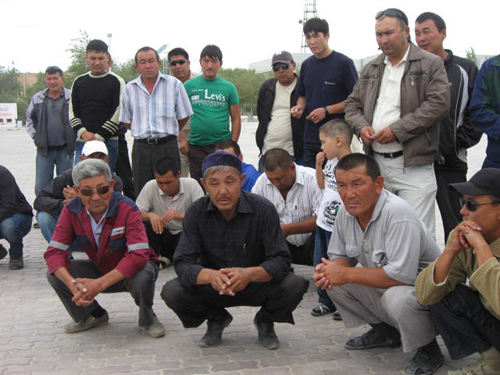The unrest follows seven months of conflicts between striking oil workers and authorities, and reportedly started in Zhanozen on 16 December, when people attacked a stage set up for the Independence Day event. – It is of paramount importance that investigations into the clashes and the resulting deaths are conducted in an independent and transparent way, said Bjørn Engesland, Secretary General. – Efforts to find peaceful solutions to this conflict should be initiated, and these efforts should be guided by fundamental human rights principles such as freedom of association and speech.
Watch Radio Free Europe video report of Kazakh police firing at fleeing protesters
The unrest rapidly developed into Kazakhstan’s most serious since independence in 1991, spreading to the regional capital, Aktau. Also in a small railway city outside Zhanaozen (Shetpe), demonstrators and police clashed. There was large scale destruction of property. However, reliable information is scarce due to lack of internet and mobile telephone coverage in Zhanozen since the beginning of the unrest.
On 17 December, President Nursultan Nazarbayev declared a state of emergency in Zhanozen, including a ban on entry to and exit from the city until 5 January 2012. The President also decreed restrictions on the use of internet media and social media in the region. Reports have indicated difficulties in gaining access to internet sources such as Twitter and YouTube in other parts of Kazakhstan as well.
– There are unconfirmed reports of large-scale arrests and mistreatment of persons held in custody in Zhanozen, said Engesland. Investigations should look into whether authorities have dealt with the unrest in ways respecting human rights.
The Norwegian Helsinki Committee urges Kazakhstani authorities to:
- Allow for independent investigation of the events. The State Commission mandated to investigate the unrest should invite representatives of civil society and independent experts to take part in its work. A Commission controlled by the government without any participation from independent groups or experts will hardly gain public trust;
- Release from prison lawyers who have been supporting the striking oil workers;
- Uphold its obligations as a state party to the International Covenant on civil and Political Rights (ICCPR). According to ICCPR Kazakhstan may restrict (derogate from) rights only in so far this is “strictly required by the exigencies of the situation (Article 4(1)). In any situation, authorities are obliged to guarantee the right to life, the ban on torture and ill-treatment, the right to liberty and security of persons. They should also respect the right to fair trial, and fundamental freedoms of thought, conscience and religion;
- Provide access to internet and mobile telephone coverage in the area of conflict, and across the country as unbiased news reporting is essential to maintaining stability at this time. Journalists and representatives of non-governmental organizations should be allowed full access to the area.
Having formerly held the chairmanship of the Organization for Cooperation and Security in Europe (OSCE), high standards in keeping with international norms must be expected of Kazakhstan at times of crisis, Secretary General Engesland Engesland concludes. – Involving international researchers in investigating what went wrong in the Mangistau region could be an important signal that the government is serious on improving its dealing with social unrest and the demands of the striking oil workers.
Background
Hundreds of workers from oil fields of western Kazakhstan have been on strike demanding better pay and working conditions since May 2011. NHC visited Aktau and Zhanozen in September 2011, learning about the situation. The Kazakh oil companies claim that the oil workers have higher average salaries than other sectors of Kazakhstan business; while the oil workers point to high costs of living and tough conditions of work in the oil sector. Zhanaozen is an isolated city in a desert-like surrounding, and everything must be brought in, making living costs much higher than in the rest of the country.
The strikes and protests by the oil workers have not been met by dialogue efforts by their employers and Kazakh authorities. About thousand oil workers have been fired and replaced by others. At the same time, the strikes have proven to be costly not only for the striking oil workers but also for the oil companies that have lost millions due to reduced production.
In a dramatic development, Natalia Sokolova, a union lawyer, has been given a six years sentence for “inciting social discord”. Another union representative, Akzhanat Aminov, has been given a two-year suspended sentence for organizing so-called illegal gatherings.
On this background, social unrest and strikes may not be seen as a result of an ideological or religiously driven radicalization, but rather as a reaction to poor distribution of the wealth created by Kazakhstan’s expanding petroleum industry. Instead of accepting that striking oil workers lose their work, authorities could initiate serious dialogue on how to improve their situation and on the overall question of improving living conditions for ordinary Kazakhstanis.
